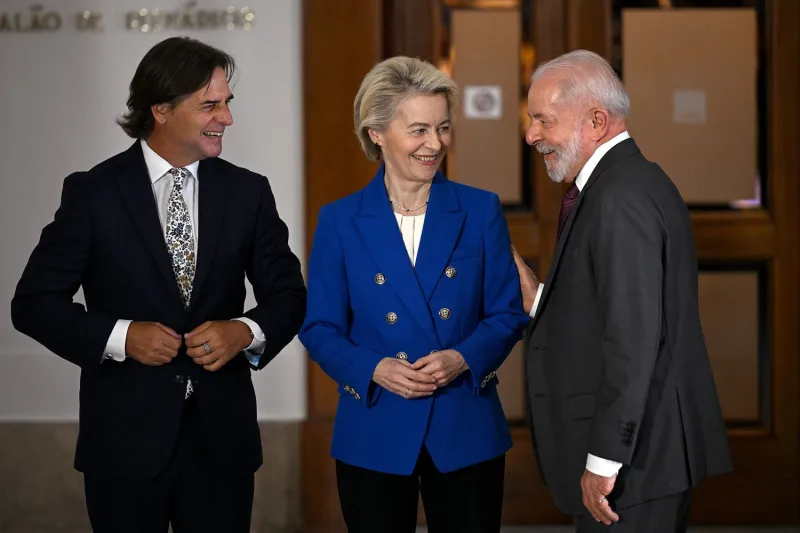Argentinian President Javier Milei waves to crowds at CPAC Argentina in Buenos Aires on Dec. 4.Tomas Cuesta/Getty Images
Milei’s milestone. After one year in office, Argentina’s president remains more popular than most experts expected, garnering around 50 percent approval in a few late November polls. Milei has made good on pledges to carry out painful cuts in public spending and the public workforce, which pushed Argentina’s economy into a recession but also lowered inflation. As of October, monthly inflation stood at 2.7 percent, down from a peak of around 25 percent last December.
Since taking office, Milei has moderated some of his most controversial campaign stances, abandoning pledges to dollarize Argentina and close its central bank. However, one area where he has been far from moderate is foreign policy, international relations scholar Juan Gabriel Tokatlian argued in ClarĂn this week.
Milei has shifted significantly toward geopolitical alignment with the United States and Israel while retreating from many of Argentina’s longstanding commitments to multilateralism.
Familiar faces. This week, Trump nominated former U.S. Ambassador to Mexico Christopher Landau for deputy secretary of state, the latest sign that Latin America will likely play a more central role in U.S. foreign policy than before. Landau would join secretary of state nominee Marco Rubio, who is Cuban American and has written and spoken extensively on the region.
Mexican officials, on edge from Trump’s tariff threats, looked positively on the nomination. “Ambassador Landau did a good job in Mexico,” Mexican President Claudia Sheinbaum said Monday. “I knew him as head of government of Mexico City.”
Bread of the tropics. Amid national strife, Haitians received a bit of good news last week. The country’s joint petition with Cuba, the Dominican Republic, Honduras, and Venezuela succeeded in adding cassava bread to UNESCO’s List of Intangible Cultural Heritage of Humanity. Flour made from cassava root has been used to make flatbread in those countries for hundreds of years.
The application marked the first time that multiple countries in the Western Hemisphere submitted a joint entry for the list. It emphasized their shared heritage despite the fact that some of the countries speak different languages today.
What is not another name for cassava or its byproducts?
Agave
Manioc
Tapioca
Yucca
The most well-known types of agave are succulents.

From left to right, Uruguayan President Luis Lacalle Pou, European Commission President Ursula von der Leyen, and Brazilian President Luiz Inacio Lula da Silva chat at the LXV Mercosur Summit in Montevideo on Dec. 6.
From left to right, Uruguayan President Luis Lacalle Pou, European Commission President Ursula von der Leyen, and Brazilian President Luiz Inacio Lula da Silva chat at the LXV Mercosur Summit in Montevideo on Dec. 6.Eitan Abramovich/AFP via Getty Images
Last Friday, top officials from the European Union and the Mercosur trade grouping (Argentina, Brazil, Uruguay, Paraguay, and Bolivia) shocked observers by announcing that they had reached an agreement after 25 years of negotiations, creating one of the world’s largest free-trade zones.
This week, the European Commission released details about what the agreement entails.
The main tenets have not changed since 2019 negotiations. They include the phased removal of tariffs for around 90 percent of goods. For some products, such as passenger vehicles, tariffs would be phased out even more gradually. The agreement would also improve European access to critical minerals from Mercosur countries.
New additions include a requirement that countries must remain “good faith” parties to the Paris climate accord and a dispute settlement mechanism that allows for compensation if one side breaks the EU-Mercosur deal.
The agreement still needs to be ratified by governments on both sides of the Atlantic. The most vocal potential spoiler is France—where farmers are concerned about the country being flooded with agriculture imports—but it’s unclear whether Paris can rally enough support to sink it. Rejecting the deal would require opposition from at least four EU countries with populations totaling 35 percent of the bloc.
If the EU-Mercosur deal passes, it could spur billions of dollars in new trade each year. A study from last December by a Brazilian government research institute estimated that by 2040, the deal would boost Brazil’s GDP by 0.46 percent annually, the EU’s by 0.06 percent, and other Mercosur countries’ by 0.2 percent.
European Commission President Ursula von der Leyen called the deal “a win for Europe.” Now she will have to pitch it to EU members to see if enough governments agree.
Source link : http://www.bing.com/news/apiclick.aspx?ref=FexRss&aid=&tid=675c343be1744fbb98bcbee84e25b5bc&url=https%3A%2F%2Fforeignpolicy.com%2F2024%2F12%2F13%2Fhaiti-united-nations-peacekeeping-crisis-gang-violence%2F&c=18199775569867344078&mkt=en-us
Author :
Publish date : 2024-12-13 00:00:00
Copyright for syndicated content belongs to the linked Source.












